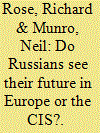| Srl | Item |
| 1 |
ID:
080945


|
|
|
|
|
| Publication |
2008.
|
| Summary/Abstract |
Historic differences between Russian elites about where the country's future lies are here addressed by examining what the Russian public thinks, using data from the New Russia Barometer survey. More than two thirds see the country's future with the Commonwealth of Independent States (CIS) and less than one third see it with Europe. Alternative explanations for these differences are tested statistically. The most important influences making Russians look to the near abroad are traditional identities, national pride and age. Although cosmopolitan contacts of individuals with the West encourage people to be pro-European, Russians are likely to continue to view their world as a CIS space. However, this does not indicate a popular demand to re-establish Imperial dominance but rather a durable commitment among most Russians to a Eurasian rather than European view of the world
|
|
|
|
|
|
|
|
|
|
|
|
|
|
|
|
| 2 |
ID:
080947


|
|
|
|
|
| Publication |
2008.
|
| Summary/Abstract |
Using data for the period 1989 - 2002, we examine the determinants of income inequality in post-communist economies. We find a strong positive association between equality and tax collection but note that this relationship is significantly stronger under authoritarian regimes than under democracies. We also discover that countries introducing sustainable democratic institutions early are characterised by lower inequality. We also confirm that education fosters equality and find that larger countries are prone to higher levels of inequality
|
|
|
|
|
|
|
|
|
|
|
|
|
|
|
|
| 3 |
ID:
080944


|
|
|
|
|
| Publication |
2008.
|
| Summary/Abstract |
This article examines the reform of the Serbian intelligence agencies since the fall of Slobodan Miloevi and argues that they are important actors in democratisation, with a powerful capacity to influence and frustrate the reform process. However, the Serbian experience demonstrates that the role of intelligence agencies in democratisation is complex. In Serbia, governance of the intelligence sector has been characterised neither by a simple maximisation of civil power over the agencies themselves, nor by outright resistance to change by inherently compromised, authoritarian-era structures. Instead, the role and reform of Serbia's intelligence agencies since 2000 has been closely integrated with developments in the political sphere, and has exhibited considerable continuity with past practice
|
|
|
|
|
|
|
|
|
|
|
|
|
|
|
|
| 4 |
ID:
080946


|
|
|
|
|
| Publication |
2008.
|
| Summary/Abstract |
Since the early 1990s voters in Russia (and most of the other post-Soviet republics) have been offered the opportunity to vote 'against all' parties and candidates. Increasing numbers have done so. The evidence of two post-election surveys indicates that 'against all' voters are younger than other voters, more urban and more highly educated. They do not reject liberal democracy, but are critical of the contemporary practice of Russian politics and find no parties that adequately reflect their views. With the ending of the 'against all' facility in 2006 and other changes in the Russian electoral system under the Putin presidency, levels of turnout are likely to fall further and the protest vote will seek other outlets within or outside the parliamentary system.
|
|
|
|
|
|
|
|
|
|
|
|
|
|
|
|
| 5 |
ID:
080943


|
|
|
|
|
| Publication |
2008.
|
| Summary/Abstract |
Quantitative measures are used to compare the age, tenure, gender and change of political elites in 18 Russian regions from 1954 to 2006. The study finds more similarities than differences between regional elites from the Soviet era and from the post-Soviet Russian era. The Russian regional political elite since 1992 is actually older than the Soviet elite and resembles it quite closely in terms of years in office and turnover, comparing both the total time spans of the elites of each era and at 10-year intervals from 1956 through to 2006. Even in relation to differences by region and gender since 1992, there has been a re-emergence of a regional political establishment in a similar pattern to that of the Soviet era
|
|
|
|
|
|
|
|
|
|
|
|
|
|
|
|